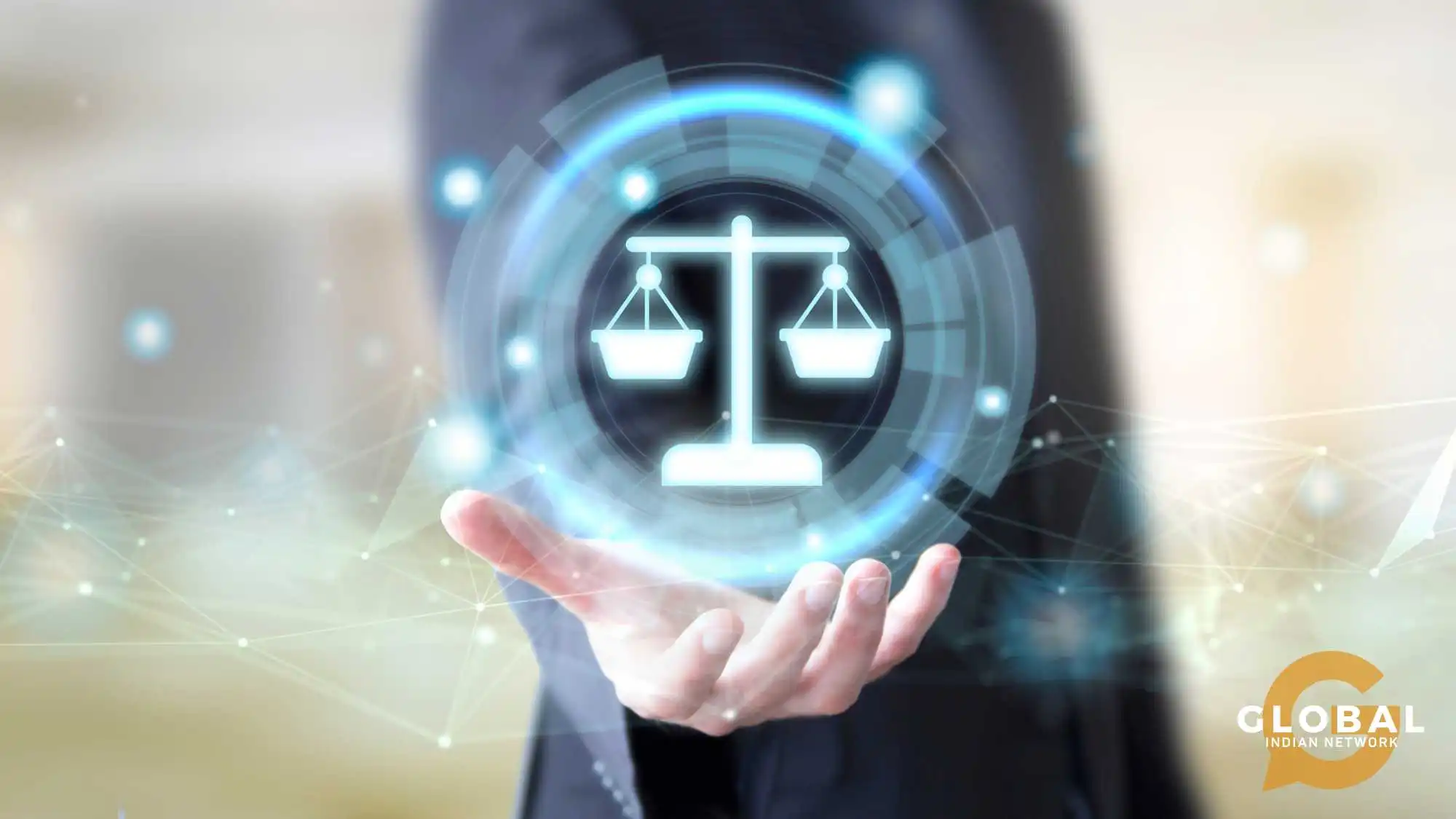Artificial Intelligence's (AI's) impact is being felt globally as it continues to take over various aspects of our lives, from technology and business to healthcare and government. As one of the key players in the global tech supply chain, India has also felt the reverberations of excitement and anxieties generated by the potential of AI. As Artificial Intelligence (AI) permeates sectors like the workforce and education, the time is near for the Indian government to follow in the footsteps of the EU and address the far-reaching implications of this 'kinetic enabler' AI beyond its economic value through legal regulations to manage its impact on larger social scale.
Join us on this blog as we look into the various regulatory frameworks the Indian government has already put in place and how they may prepare the way for concrete Artificial Intelligence Laws in India in the near future.
Table of Contents
What is Artificial Intelligence (AI)?
Artificial Intelligence (AI) is a technology that simulates human intelligence in machines, enabling them to perform tasks that typically demand human cognitive abilities. These tasks encompass language comprehension, identifying patterns, making decisions, solving problems, and adapting to new situations.
The advent of AI has broadened horizons across sectors through its efficiency and adaptability. Explored below are some of the subsets of AI that are most widely used today. Note that some of these categories are not to be seen as exclusive as they often depend upon and interact with one or more technologies.
Machine Learning: Uses algorithms to enable computers to learn from data and experiences either autonomously, without explicit programming, or supervised with training datasets. Due to its high adaptability, machine learning has numerous subsets, which have been instrumental in addressing intricate challenges across diverse sectors like finance, healthcare, manufacturing, and logistics.
Natural Language Processing (NLP): Focuses on understanding and manipulating human language and speech patterns. It has been gaining traction due to advancements in machine learning and deep learning. Adept at text classification, sentiment analysis, and machine translation, NLP is the technology used to create chatbots and personal assistants. Examples include Google Translate, Siri, and Alexa, which utilise NLP to comprehend and respond to human language inputs.
Reactive Machines: This type of AI system lacks memory and is task-specific, designed to deliver the same output for a given input consistently. Machine learning models often fall into this category, using customer data to provide personalised recommendations, such as Netflix suggesting shows based on viewing history. While reactive AI excels at processing vast amounts of data, it cannot predict future outcomes without relevant information. For instance, IBM's Deep Blue predicts moves without considering past mistakes.
Deep Learning: Deep learning, a subset of machine learning, has gained significant attention due to its success in tasks like computer vision, speech recognition, and autonomous driving. These networks consist of interconnected layers of neurons, whose depth allows them to learn complex patterns in data. Through training, which adjusts connections between neurons based on data, deep learning models excel at recognising intricate patterns, making them valuable for tasks like image recognition and natural language processing. This versatility has fueled the widespread adoption of deep learning across various AI applications.
Robotics: Robotics systems represent an AI subset physically deployed to control objects. Industrial robotics automate manufacturing processes, handling tasks deemed risky, dirty, or monotonous, thus enhancing safety and productivity. On the other hand, service robotics systems aid humans in performing challenging or hazardous tasks across various domains, such as healthcare and defence.

Artificial Intelligence (AI) in the Indian Context
Artificial intelligence (AI) has been rapidly gaining momentum in India, positioning the country on the brink of a significant technological transformation with profound economic and social implications. According to an article by Hindustan Times, India's AI market is set to see a 20% surge in the coming five years. Boasting the world's third-largest AI talent pool, the drive for social good, and the need to overcome linguistic challenges, India is rapidly adopting AI tech in healthcare, education, agriculture, and sustainability.
Despite the exponential benefits of AI innovation, especially in agri-tech, fin-tech, the semiconductor industry, and business, it is also essential to acknowledge its implications for human values and ethics. While the rise of new AI applications like ChatGPT and Midjourney has sparked excitement in the business world, there is also plenty of room for worry about extreme uses of AI, as seen in deepfake videos and images, giving rise to concerns about autonomy, privacy violation and the jeopardising of intellectual property rights.
Unregulated use of AI also raised issues in education, with rising risks of plagiarism, misinformation, bias, and breach of academic integrity. Given the current state of employment in the country, the advent of AI has provoked much anxiety about further depletion of the job market and loss of available jobs to artificial intelligence. Contrary to previous concerns about AI displacing blue-collar jobs, it is also replacing white-collar positions, making its way into management, law, accountancy, finance, consultancy, and computer programming.
In the wake of these rapid and unprecedented changes, the need for government intervention and serious artificial intelligence laws in India has become paramount. The law and government must step up to the occasion and introduce effective regulatory frameworks and comprehensive artificial intelligence laws in India that directly address AI and its use.
Existing Policy Framework for the Use of AI
India's legal framework currently does not provide laws directly addressing AI, and the government has shown concerns about this gap. Recently, IT Minister Ashwini Vaishnaw mentioned the absence of regulatory artificial intelligence laws in India, stating the challenges of introducing provisions due to numerous moral and ethical issues associated with AI's growth in the country. Additionally, the Indian government has established the Ministry of Electronics and Information Technology (MeitY) as a regulatory body to oversee e-governance, cyber security and sustainable IT growth.
On the 1st of March this year, The Ministry of Electronics and Information Technology announced that artificial intelligence (AI) tools and models currently undergoing testing and training will need government approval and authorisation before launching. Unreliable and unapproved models shall be available only on the Internet.
The NITI Aayog
In 2018, the NITI Aayog, the Indian government's top public policy 'think tank', was assigned to establish responsible AI development guidelines. The NITI Aayog introduced the National Strategy for Artificial Intelligence, outlining AI's role in various sectors like healthcare, agriculture, education, smart cities, and mobility.
This bill introduces principles and obligations for entities handling personal data, such as consent, purpose limitation, data localisation, and accountability. It also proposes the creation of a Data Protection Authority to oversee and enforce these provisions. Additionally, the bill addresses concerns related to profiling and automated decision-making, requiring explicit consent for processing personal data using AI algorithms that significantly impact individuals' rights and interests. Overall, the Personal Data Protection Bill seeks to enhance data privacy and security in the digital landscape, ensuring individuals have control over their personal information.
In February 2021, they released Part 1 - Principles for Responsible AI, focusing on ethical considerations in AI deployment, including decision-making principles and societal impact on job creation. In August 2021, Part 2 - Operationalising Principles for Responsible AI was released, detailing actions for both the government and private sector to implement responsible AI practices through regulatory interventions, capacity building, ethics by design, and compliance frameworks.
The CEO of NITI Aayog, Amitabh Kant, acknowledged the ethical and societal considerations regarding AI and the government's intentions to set responsible standards for its use. However, he confirmed, "The government is not considering bringing a law or regulating the growth of artificial intelligence".

Laws That Indirectly Address AI
The Information Technology Act, 2000 (IT Act), the primary legislation governing electronic transactions and digital governance in India, has sections relevant to AI-related activities, such as Section 43A, which allows compensation for data privacy breaches. It upholds the importance of safeguarding personal data from AI systems.
The Information Technology (Intermediary Guidelines and Digital Media Ethics Code) Rules, 2021, stemming from The IT Act, 2000, establishes guidelines for digital intermediaries and social media platforms which aim to promote accountability, transparency, and responsible behaviour online. It requires platforms to implement measures for content moderation, grievance redressal, and user privacy protection.
The Indian Copyright Act, 1957 protects original literary, artistic, musical, and dramatic works against unauthorised use. There is, however, a debate around AI-generated content. In the case of Gramophone Company of India Ltd. v. Super Cassettes Industries Ltd. (2011), the Delhi High Court ruled that AI-generated music lacks human creativity and is therefore ineligible for copyright protection.
The National e-Governance Plan aims to digitise government services and use AI to improve efficiency and accessibility. Various government departments have integrated AI to automate processes and enhance citizen services.
The New Education Policy (NEP) includes provisions for coding classes for students from 6th standard onwards, foregrounding the government's efforts to establish India as an innovation hub.
The Digital Personal Data Protection Bill, 2023 (DPDP Bill), introduced by The Ministry of Electronics and Information Technology, aims to establish a comprehensive framework for handling personal data, including principles and obligations, such as consent, purpose limitation, data localisation, and accountability. It also addresses concerns regarding profiling and automated decisions by AI algorithms in processing personal data, which significantly impact individual rights and interests.
The Draft Digital India Act 2023 is a proposed law in India designed to replace the current Information Technology Act of 2000 and is set to undergo public consultation soon. The Act aims to establish a comprehensive legal framework for India's digital economy, covering issues like cybercrime, data protection, online safety, and intermediary regulation. It also includes provisions to create a new government agency overseeing the digital sector. Notably, concerning AI, the legislation may specify restricted areas for companies and internet intermediaries using AI facial recognition technology to protect users from potential harm and impose penalties for violations.
The Need for Artificial Intelligence Laws in India
Given AI's ethical issues and risks, such as potential bias, privacy violations, lack of transparency, and uncertainty about liability attribution, various central and state government entities are now working to standardise responsible AI development and usage while promoting best practices. However, MeitY admitted that India's current AI-related strategy is inadequate in addressing these concerns.
The Indian system has several shortfalls in adequately addressing the problem of AI:
Lack of dedicated AI legislation: India lacks specific laws tailored to address AI-related issues comprehensively. Although certain parts of existing laws, such as the Information Technology Act of 2000 and the upcoming Personal Data Protection Bill of 2019, touch on AI-related matters, they fail to fully tackle the distinct challenges and intricacies that AI technologies present.
Unclear ethical guidelines: The absence of clear and enforceable ethical guidelines and comprehensive regulations for AI development and usage may lead to inconsistent practices and potential misuse.
Concerns about bias and discrimination: AI systems can perpetuate biases already present in historical data. The existing legal structure in India does not directly address concerns regarding bias and discrimination in AI algorithms, leaving room for discriminatory practices to occur.
Accountability and liability issues: Owing to AI's autonomy, assigning liability for harm or errors caused by AI systems is complex. Identifying responsibility and accountability for incidents or accidents involving AI can be legally complicated under current laws.
Insufficient regulatory oversight: While the Personal Data Protection Bill proposes a Data Protection Authority, a dedicated regulatory body for AI is needed to ensure comprehensive oversight and enforcement. The lack of a regulatory body for AI may lead to fragmented supervision and restricted enforcement of AI regulations.
Ambiguity in intellectual property rights: Existing laws may not adequately protect AI-generated content and inventions, leading to uncertainty regarding copyright ownership and patentability, known as 'Attribution issues.'

Conclusion
From the emergence of AI-driven innovations across various sectors to concerns regarding privacy, bias, and accountability, it is evident that a comprehensive legal framework is essential to ensure responsible development and deployment of AI systems. The proposed Digital India Act 2023 and ongoing initiatives by government bodies such as NITI Aayog signal positive steps towards forming solidified artificial intelligence laws in India to address these issues. However, public consultation and continuous adaptation of laws will be crucial to effectively regulate AI use and safeguard the interests of users, businesses, and citizens in India's rapidly evolving digital landscape.
FAQs
Is the AI Act a regulation?
Yes, the AI Act is a regulation. It is the world's first comprehensive AI law that regulates the use of artificial intelligence in the EU, aiming to ensure safety, transparency, traceability, non-discrimination, and environmental friendliness in AI systems.
What is India's national AI policy?
India's national AI policy is known as the "National Strategy for Artificial Intelligence #AIforAll.", introduced in 2018 by the NITI Aayog. This policy focuses on leveraging artificial intelligence not only for economic growth but also for social inclusion. It aims to empower individuals with job skills, invest in research and sectors for economic and social impact, and scale Indian-made AI solutions globally.
What is the regulation of AI by the government?
While there are no specific artificial intelligence laws in India, the government has taken significant steps to address ethical considerations and operationalise principles for responsible AI. The NITI Aayog, India's apex public policy think tank, released the National Strategy for Artificial Intelligence #AIForAll in 2018, focusing on various sectors like healthcare, agriculture, education, smart cities, and infrastructure. Additionally, the government has enacted a new privacy law, the Digital Personal Data Protection Act, in 2023, which can be leveraged to address privacy concerns related to AI platforms.










[…] recent years have witnessed a milestone in technological advancement with the advancement of Artificial Intelligence (AI), which has been readily embraced as a transformative force in every sector of human […]
[…] explore the impact of Artificial Intelligence (AI) on small and medium-sized enterprises (SMEs) in the Indian manufacturing […]
[…] it poses a challenge to all the stakeholders to ensure that while the economy is being plunged into artificial intelligence mode, no group of people is left behind to suffer in the process. The answer is to recognize AI as […]